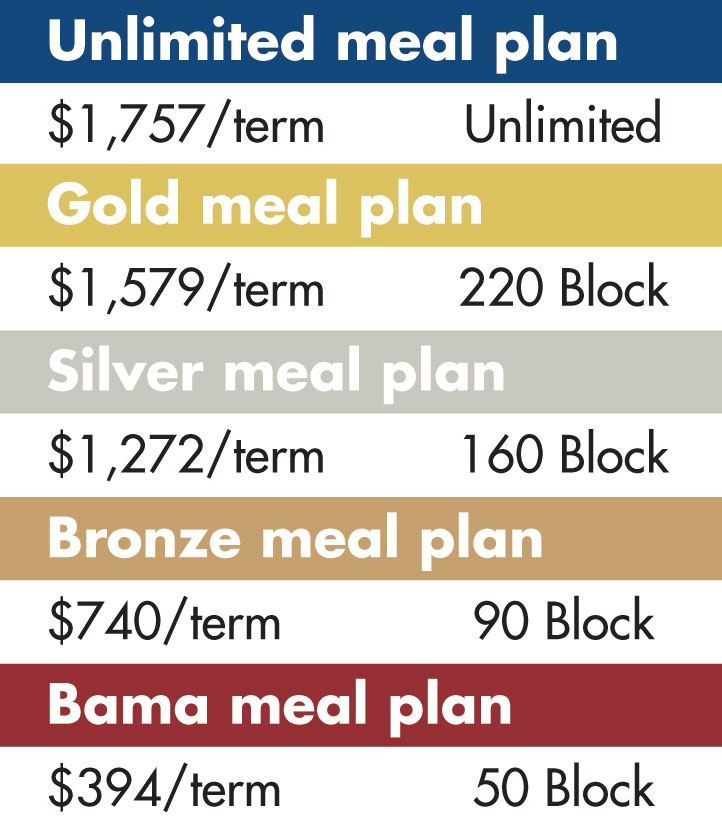According to campusdish.com, Meal Plans offer students easy access to conveniently located great-tasting meal options on campus.
Some students disagree.
“The Meal Plan is just as, if not more, unconstitutional as dining dollars,” Gavin Wilson, a senior majoring in kinesiology said. “The University makes freshman get it and it’s expensive and mandatory. It’s like the University is making students stay on campus, forcing us to spend money to the University.”
Wilson said the mandatory guidelines for Meal Plans create an alternative way for the University to make money off of students. Wilson said the food quality isn’t up to par compared to the price.
“The dining halls have buffets, but the University needs to realize it’s not about quantity, it’s about quality,” he said.
Currently there are four all-you-can-eat dining halls on campus: Lakeside Dining Hall, Burke Dining Hall, Bryant Hall and The Ferguson Center’s Fresh Foods Company, according to bamadining.com. Julia’s Market in Tutwiler Hall accepts Meal Plans for grab-and go-selections.
The University’s media relations said they are unable to comment on Meal Plans due to the pending Dining Dollar’s lawsuit.
The University offers seven different Meal Plan options. Prices range from $394 per term to $1,757 per term.
Termination of Meal Plan contracts is accepted for first-year students with evidence of housing exemption, according to the website. Meal Plan cancellations for the fall term are not permitted after the first business day of September and for upperclassmen only.
“When I came to orientation I ate at Lakeside and they had nice-sized steak, shrimp and chicken, and they haven’t had steak since,” freshman Briana O’Neal said. “I only get two meals a day with my meal plan, it’s like the University is encouraging you to be anorexic, people need three meals a day.”
O’Neal said Meal Plans are rhetorical. She thinks Meal Plans should offer three meals a day at a discounted price.
Meal Plan cancellations for the spring term will not be accepted after the first day of class. All Meal Plan cancellations will incur a $35 processing fee, according to the website.
Meal Plans are sold as a yearly contract. Rollover meals only roll over from the fall to spring semester, according to the website.
First year students active in the greek community will automatically have their Meal Plan reduced to 50 meals per semester. Some fraternities and sororities have their own mandatory meal plans.
“Being in a fraternity, I eat two meals a day at the house,” said Evan Brooks, a freshman majoring in political science.
“The quality of food on campus is pretty good; it’s a step up from high school. I don’t understand why our parents are mandated to pay for a Meal Plan, though,” he said.
Sam Haney, a freshman majoring in business, likes the convenience of a Meal Plan.
“Living in a dorm, it’s hard to cook quality meals,” he said. “It’s so easy to go to a dining hall, swipe your card, and have the option to eat a variety of pretty good food.”
Meal Plans are also offered to faculty and staff.
The “Use Anytime Plan” is offered in 10 meal increments that allow faculty and staff to choose between 10 to 50 meals that never expire. Prices for these meal plans range from $76.30 to $359.50, according to bamadining.com
“I don’t think a Meal Plan is worth it; I would rather work 20 hours a week, get food stamps and go to Walmart and buy some chicken and shrimp and eat that,” O’Neal said.









